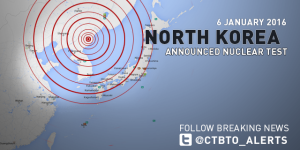
Just when you think progress is being made, things can go backwards real fast. Fifty years of work to advance nuclear arms control seems set back to the stone age recently – but the stones being thrown around are getting bigger and more dangerous,
Technology and sensor data will be playing a big role in determining what happened this morning. Arms control programs advanced during the thaw between the US and Russia led to confirmation that sensor data can distinguish between conventional and nuclear detonations underground. Seismic data is now being analyzed for familiar signatures that can help characterize the event. Independent nonprofit groups such as NRDC also keep a watchful eye on these situations to promote understanding and pathways to arms control. Other work by governments, IAEA, NGOs and the scientific community created radiation monitoring technology that can measure the the ratio of key isotopes of radioactive Xenon and Krypton gases in the atmosphere to further characterize the event. Most radiation from the event will likely be contained in the earth, but enough Xenon will eventually escape that sensitive equipment will be able to detect it. The CTBO, Comprehensive Test Ban Organization, is charged with monitoring these types of events, and many governments also have independent programs. It will take days or weeks for all the data to come in. Here are a few links that seem interesting at this moment in time:
The Bulletin of the Atomic Scientists
Arms Control Association Special Report
Yes, Geiger Counters equipped with pancake type detectors can detect the radioactive noble gases Xenon and Krypton better than most detectors, but they cannot differentiate between the isotopes and also would have difficulty detecting subtle levels that would occur at a large distance from the underground site due to dispersion.
Comments closed
